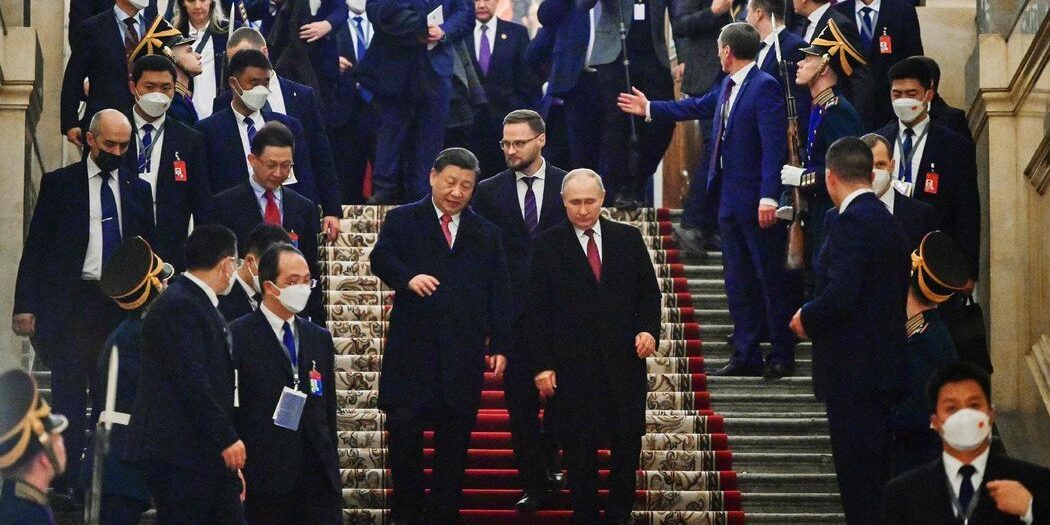The Rejection of China by Wealthy Nations: Why?

This year, China has organized several major events, such as the Universiade, the Asian Games, the China-Central Asia Summit, and the China-LAC Business Summit, among others. However, when we look at the foreign heads of state who attended these events, the majority of them were from Asian, African, and Latin American countries.
As a result, some people have started to reflect: “China doesn’t have good friends.” “We need to reflect on why we are so isolated,” and so on. Although such statements may contain elements of misleading, there are indeed people who are perplexed as to why our relationship with developed countries suddenly turned sour. Some even naively believe that it is because we have been too “wolf warrior,” which has upset the developed countries, leading to this situation.
So, is it really the case? No, it is not. The deterioration of China’s relations with developed countries has nothing to do with our attitude towards them. Fundamentally, it is due to industrial competition.
We all know that Americans like to say a phrase: from a position of strength. What does an international order based on strength mean? It can be understood as military power, but on a larger scale, it is based on the international industrial order dominated by the United States.
We can see that although the United States has led globalization, the majority of industries that have been relocated are low-end industries. The high-profit high-end industries are still firmly controlled by the United States and its allies.
In this system, the United States controls high technology, finance, military industry, aerospace, pharmaceuticals, computers, agricultural machinery, and so on. The United Kingdom controls higher education and finance, France controls nuclear power and aircraft, Germany controls precision machinery and chemical industry, and Japan and South Korea control semiconductor materials manufacturing and automobiles, respectively. In essence, each country has its own domain.
What are the benefits of this system? On the one hand, it can leverage the advantages of each country, reduce production costs, and ultimately serve the United States. On the other hand, because these countries are relatively small in size, giving them a few industries can easily ensure national prosperity and a good life, eliminating the motivation to threaten the industrial dominance of the United States. This system has been operating smoothly for decades. The United States and developed countries have been sitting at the top of the pyramid, enjoying the profits from selling chips at exorbitant prices, and draining the blood of developing countries for decades.
Until China emerged on the scene. China’s situation is different from all other countries. On the one hand, China is a country with a population of over 1 billion, and every person in this country wants a better life. However, the low-end industries transferred from Western countries cannot provide a decent living for the Chinese people. Even if the United States generously transfers some high-end industries to China, the coverage of these industries cannot reach every Chinese person. Look at South Korea’s Samsung, its employees, and the ripple effect it brings to the industrial chain, which can drive employment for 20% of South Korea’s workforce. Which Chinese company can achieve that?
Therefore, China’s pursuit is the upgrading of all industries, the rise of various industries to cover more Chinese people, and to ensure a better life for everyone. It doesn’t matter how many jewels you have on your industrial crown; I will find a way to get them. Frankly, China really has the ability to do so.
In fact, there are many countries that have the desire for industrial upgrading. For example, Modi talks about “Made in India,” Erdogan talks about “Made in Turkey,” and even Mexico has started promoting “Made in Mexico.” However, Western countries are only concerned about China. Why? Because other countries are just making slogans, while China is seriously and steadily working on it. China has the most complete industrial supply chain in the world. Millions of science and engineering students graduate every year. China also has a huge domestic market and strategic support at the national level. Additionally, a national sentiment ingrained in the Chinese people’s genes says, “Do these nobles really earn their crown, or is their privilege just handed down?” All these factors lead to a high probability of China succeeding whenever it wants to accomplish something. Look, how long has it been since Chinese people started focusing on chip development? They have already developed Kirin 9000s at the 7nm level. This kind of speed is truly astonishing.
Why can Westerners work only 4 hours a day, spend another 4 hours drinking coffee, go on holidays in the Mediterranean, sunbathe, and flirt around, and still not be satisfied, often resorting to strikes? It’s because their high-end industries support that kind of lifestyle. With the technological and industrial advantages of their countries, they can comfortably live a good life after occupying a dominant position. They can casually build an airplane and in return, obtain 700 million shirts produced by developing countries through hard work and sweat. This is the gap brought about by different industries.
But now China has started playing the game of industrial upgrading, and Western countries may have reached the end of their comfortable days. China broke through shield tunneling machines, and Germany’s Waldrich Coburg Machine Tool Factory went bankrupt. China broke through pen nib steel, and Japan’s Shimomura Tokushu Seiko suffered a sharp decline in profits and was on the brink of collapse. China started manufacturing mobile phones, and as a result, Nokia and Motorola both died. You’ve killed off companies that were making money effortlessly. How can you expect them to have a good impression of you? Taking someone’s livelihood is like killing them! If you lose in the market competition for selling vegetables, you can switch to selling fruits. But if the country loses in industrial competition, what can you do? This is the result of decades of international division of labor according to rules. It’s not that easy to change careers!
Therefore, industrial competition is a very frightening relationship. It’s a matter of life and death, without cooperation and mutual benefit. It has nothing to do with ideology, democracy, or human rights. Look at Japan, it used to be the United States’ underling, but once it posed a threat to the United States in the industrial sector, it was beaten and suffered a Lost Decade.
What’s even more terrifying is that China’s industrial upgrading is all-encompassing. It is targeted not only at the United States but at all developed countries. Whether it’s automobiles, high-speed rail, chips, or medical devices, they are all mine. They want everything.
In this situation, how can you expect developed countries to treat you the same way as before?
It’s like a villager who comes to the city and helps the city folks sweep the streets, work as a nanny, and pick up garbage. These are tasks that the city folks need but don’t want to do themselves. The two complement each other perfectly, with no conflicts, so the relationship is harmonious. However, when this villager who came to the city learns skills through self-study, gets a diploma, and starts competing with the city folks for white-collar jobs how do you think the city folks will view this villager who is coming to snatch their jobs?
There are countless examples of this principle in reality. Why is the United States challenging China over the Xinjiang issue? It’s because China’s cotton-picking machines have taken away John Deere’s market. Why have Sino-Japanese and Sino-Korean relations plummeted in recent years? It’s because China’s chip, shipbuilding, and automobile industries have encroached upon the pillar industries of Japan and South Korea. Why is the European Union conducting an anti-dumping investigation against Chinese electric cars? It’s because they have worked hard in the automotive field for over a hundred years, accumulating numerous patents in areas such as engines and transmissions. But now, the Chinese have developed batteries and electric motors, instantly rendering their over a hundred years of accumulation obsolete! Originally, if electric cars were only sold in China, it would be tolerable. They could simply stop making money from China. But now Chinese electric cars are selling well in Europe. Who else would they investigate if not you? European car manufacturers and thousands of companies in the supply chain don’t want to be starved!
We still remember when Obama said ‘If over a billion Chinese citizens have the same living patterns as Australians and Americans do right now, then all of us are in for a very miserable time.’ Many people understand this as meaning that if Chinese people were to consume resources at the same level as Americans, it would put immense pressure on the Earth’s resources and environmental carrying capacity.
However, from a broader perspective, Obama’s words clearly have another meaning. That is, if Chinese people were to live like Americans, it would mean that they have achieved industrial breakthroughs and have enough high-paying jobs. It would imply that they have taken away many high-end industries. As a result, the overall living standards of developed countries would inevitably decline, which would be a “very miserable time” for them. Obama made this statement in 2010, and from this point of view, the West has been highly vigilant about China’s industrial upgrading from the beginning.
As China’s industrial upgrading continues to progress, this vigilance naturally evolves into aversion and even hostility. Therefore, the collective shift in attitude of developed countries towards China is not because of our “wolf warrior” stance or arrogance, but rather the inevitable result of China’s industrial upgrading. Even from the moment China decided to upgrade its industries, the current outcome was already predetermined. We are bound to confront developed countries face-to-face in international industrial competition.
China’s true market and future lie in the vast developing countries, most of which maintain friendly relations with China. For example, the number of countries participating in the Belt and Road Initiative has reached 151, accounting for three-quarters of the countries in the world. China’s friends have not decreased but increased.
China’s pursuit is not to form a small circle like developed countries and exploit developing countries while sitting atop the pyramid. Instead, it aims to promote the development of developing countries through initiatives like the Belt and Road and RCEP. It wants to build a community with a shared future for mankind where everyone has the qualifications to live a decent, prosperous, and high-quality life, just like people in Western developed countries.
This is China’s dream and the responsibility it undertakes as a major country reshaping the international order.
(For the full article please check: https://mp.weixin.qq.com/s/yRkLYqa5cGV094kYwRfDfg )





